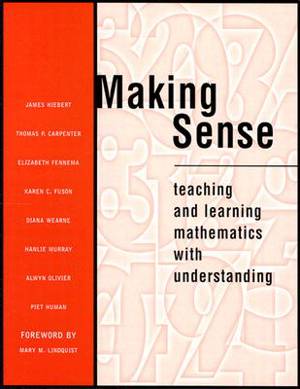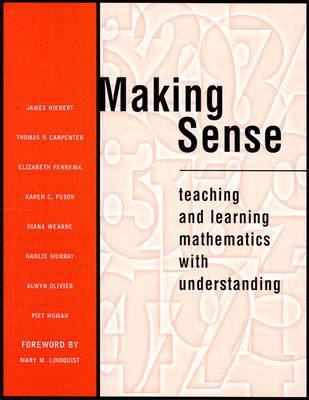
- Afhalen na 1 uur in een winkel met voorraad
- Gratis thuislevering in België vanaf € 30
- Ruim aanbod met 7 miljoen producten
- Afhalen na 1 uur in een winkel met voorraad
- Gratis thuislevering in België vanaf € 30
- Ruim aanbod met 7 miljoen producten
Making Sense
Teaching and Learning Mathematics with Understanding
James Hiebert, Thomas P Carpenter, Elizabeth Fennema, Karen Fuson, Diane Wearne, Hanlie MurrayOmschrijving
The key to effective math learning lies not in the regurgitation of isolated facts but in the ablility to reason with and use what is learned--in understanding the concepts. But what does it mean to design a classroom so that understanding is the primary objective? What would a system of instruction look like if we took seriously the goal of helping all students understand mathematics?
In this ground-breaking book, James Hiebert and his colleagues arm teachers with the best current research-based ideas for designing--and defending--classrooms that support students' mathematical understanding. It is based on the authors' work in four separate research programs, all of which investigated the effects of specific instructional approaches. Out of their ongoing discussions emerged a striking consensus about what features are essential and what features are optional, which they share in this book. They also provide glimpses into their individual projects and into the classrooms from which they have drawn many of their ideas.
By describing the essential features of classrooms that support students' mathematical understanding and by offering pictures of several classrooms that exhibit these features, Making Sense provides a valuable framework within which elementary teachers can reflect on their own practice and think again about what it means to teach for understanding.
Specificaties
Betrokkenen
- Auteur(s):
- Uitgeverij:
Inhoud
- Aantal bladzijden:
- 208
- Taal:
- Engels
Eigenschappen
- Productcode (EAN):
- 9780435071325
- Verschijningsdatum:
- 21/04/1997
- Uitvoering:
- Paperback
- Formaat:
- Trade paperback (VS)
- Afmetingen:
- 180 mm x 226 mm
- Gewicht:
- 340 g

Alleen bij Standaard Boekhandel
Beoordelingen
We publiceren alleen reviews die voldoen aan de voorwaarden voor reviews. Bekijk onze voorwaarden voor reviews.











